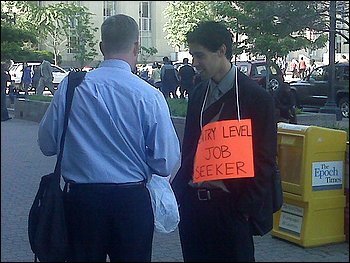I mentioned on Saturday that I wanted to further discuss the merits of international volunteering. To set the stage, Alanna Shaikh (of Blood and Milk and Global Health) and I have had a somewhat lengthy, behind-the-scenes discussion of volunteering in international development and its relation to starting a career in the field. It all started with Alanna’s comment to my long-ago post on the notion of “voluntourism” (essentially a short-term, working vacation in which one volunteers abroad and pays an organization to facilitate the experience):
I have to say, I am not impressed by voluntourism. If you have actual useful skills that can help people, then you can be paid to work abroad. If you have so few skills that you need to pay someone to take you, then how much good can you be doing?
A pretty provocative comment, I thought. And even a bit harsh. How can she, or we, judge another person’s intent as they enter a volunteer experience? How do we know they have no skills to offer? We don’t know the circumstances which led them to the particular volunteer program they going through (whether they are paying for that experience or not)—so how can we judge the impact they will have or the benefit they will receive from the experience?
After pondering her comment, though, and then discussing it with her further, I realized Alanna was not being judgmental but rather realistic. It also occurred to me that there’s a general tendency in our fields (the diverse and varied whole of international education, exchange, and development) to view any and all volunteer work as positive—both on a resume and to the organization/project/people being served. But Alanna’s perspective blows that rosy view out of the water by saying “just because you mean well doesn’t mean you’re actually helping.” A cold dose of reality, and one that I think more people—especially more young people looking at careers in development—need to have. Our discussion went something like this:
I queried Alanna to expand on her voluntourism comment. I countered that volunteering is a great way to gain international experience and contacts in the field. In addition, those who volunteer are aiding a good cause and certainly are not without many skills to offer. Alanna countered my optimism with a view from the field:
I think it boils down to this: you cannot do good development work in such short stints. You can’t even contribute to good development work, because the learning curve is so long you’d be gone before you were useful. All you can do is be an extra pair of hands, which displaces local labor. The vast majority of respectable/major development agencies therefore do not use short-term volunteers.
Almost everyone you pay to volunteer with is either a little bit shady, or doing work that doesn’t have much impact. That means your contacts with them aren’t worth much. I am not the only one who holds this view; most everyone I have ever worked with thinks the same thing. I’ve done a fair amount of hiring and reviewing resumes, and for me, voluntourism generally counted against the candidate, not in their favor, and once again, I know I am not the only one who feels that way.
Here was a perspective on volunteer work I hadn’t heard before—a perspective that is not necessarily well or widely heard, I don’t think, outside the experienced development community. But I needed this to be fleshed out more, so I further queried Alanna:
—If short term volunteers are unable to make an impact on a project, what about long-term volunteers? Are they often used? And if so, what is the minimum amount of time needed in a certain place/on a certain project in order to make a positive impact on the project?
—I can see how “voluntourism” (i.e., paying for an altruistic experience abroad) could be viewed negatively—but how do you view volunteer work in general on a resume (not voluntourism but legit long-term volunteer work with a reputable development agency)?
—Should young people look for international development experience through long term volunteer work? Or are they better served looking for internships or paid positions?
Alanna’s thoughts on these subjects went like this:
1) Long-term volunteers are useful. I’d say you need to stay at least 2 months to qualify.
2) You are right that people generally distinguish between paid and “legitimate” volunteer work, and regular volunteer work is viewed positively as field experience.
3) I’m a big proponent of just showing up to get in-country experience, though I think standard volunteer, internship, and fellowship programs are also effective. I actually wrote about these things once. Also, someone also recently commented on my blog and made the great point that you can also volunteer in your home country to build technical skills. Working with immigrants, for example, or women’s health would be skills that could help you get an international job.
I am still a proponent of international volunteer work for the main purpose of gaining international experience and even if there is no more specific strategic goal attached (i.e., I taught English in China, an experience which, while I don’t work directly with China-related issues right now, has played a big role in my movement into work in international exchange and has always looked good on my resume). But Alanna has really provided an impetus, I think, to look beyond the rosy picture of volunteering and view it more critically, both in terms of the benefit it will have on your career and the benefit it will make to the people/project you are trying to serve.



